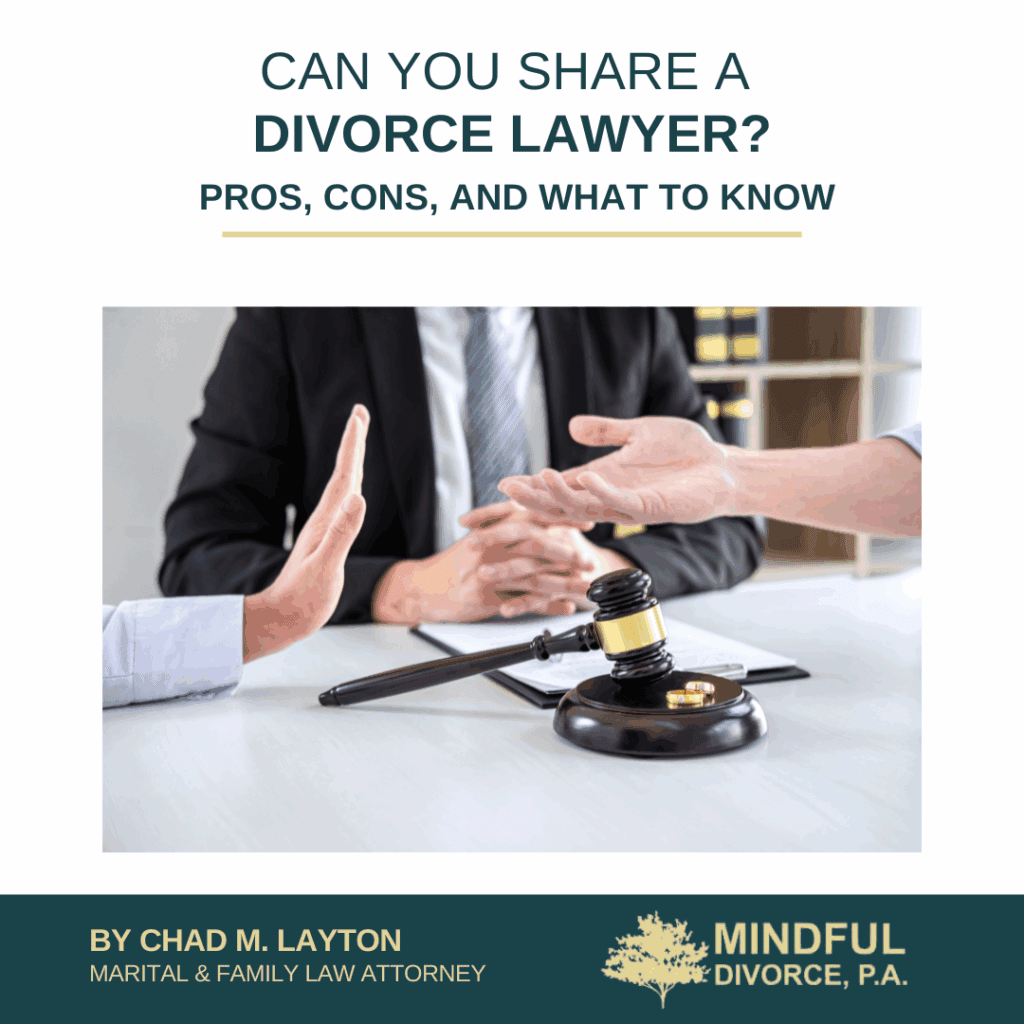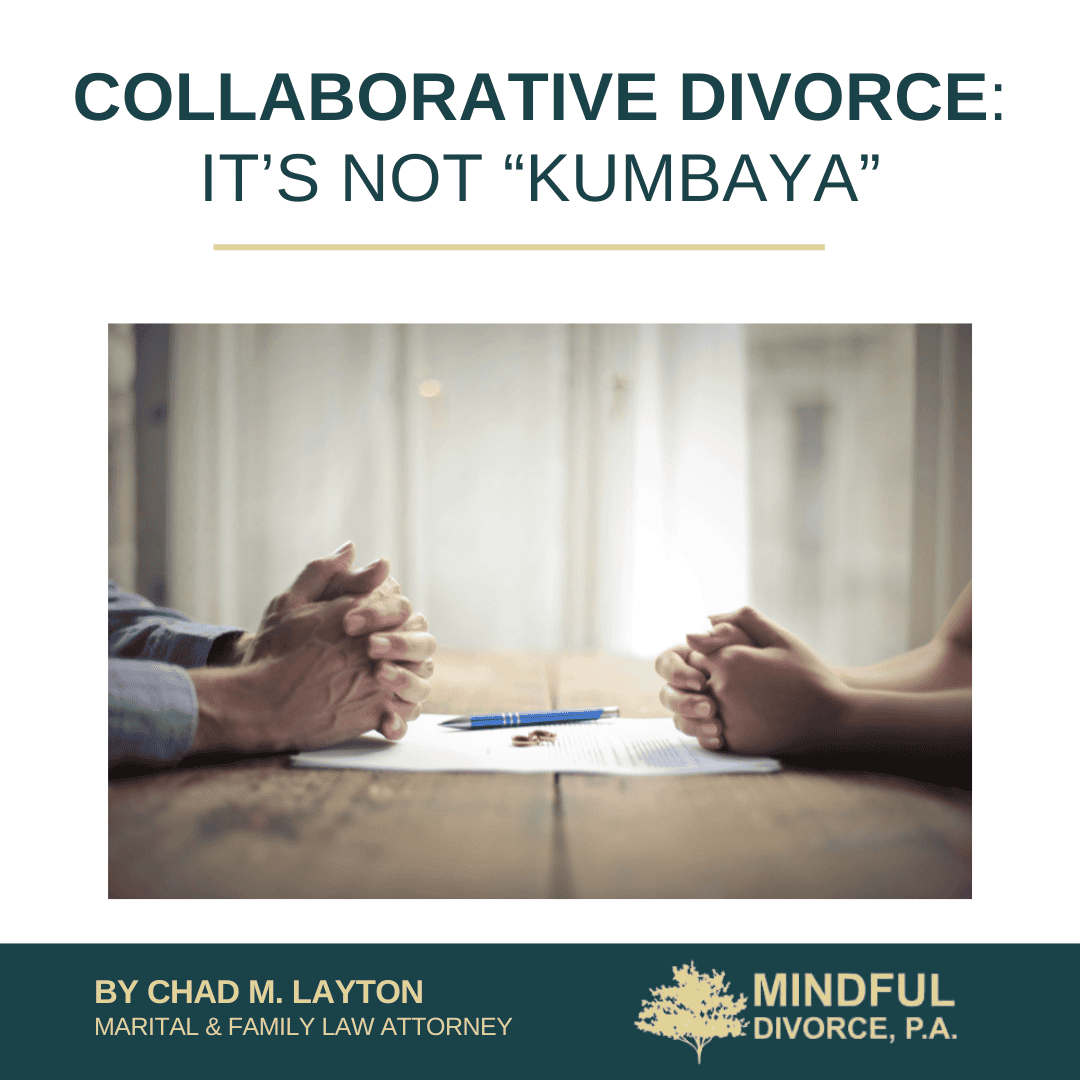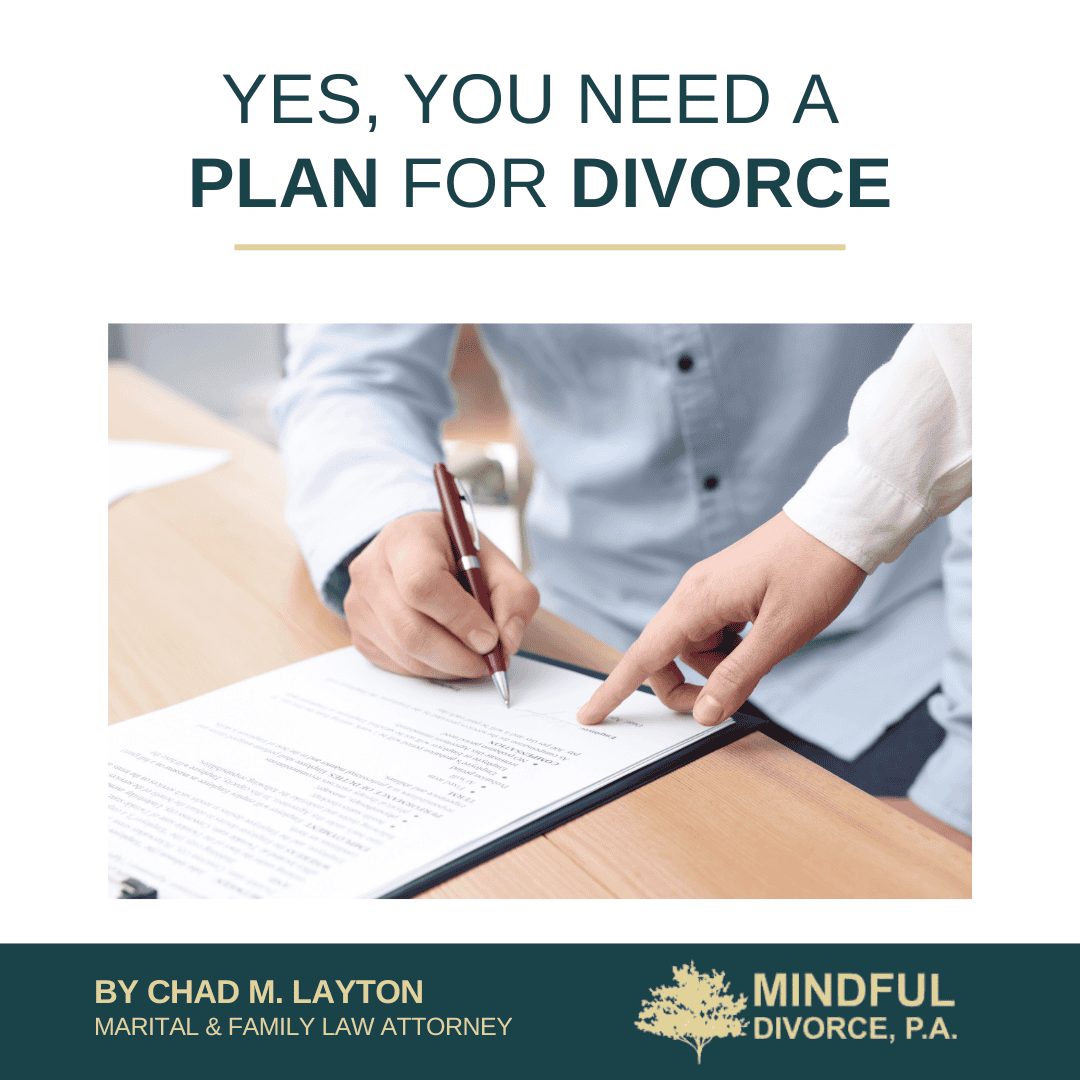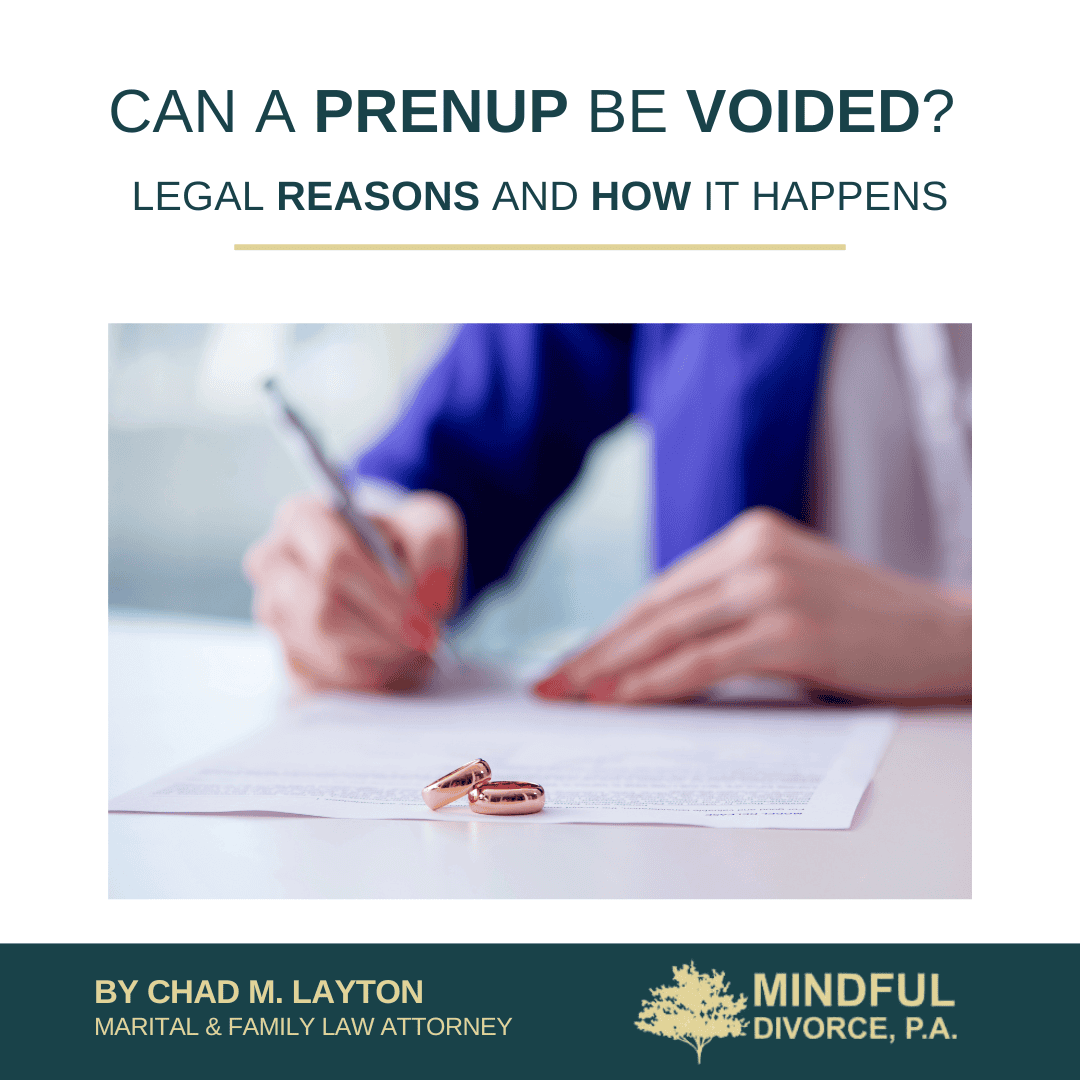
Wondering if both of you can hire one lawyer for a Florida divorce? The idea sounds simple and cheaper, especially if things feel calm right now. Divorce carries a lot of emotion and pressure, though, and the way you choose legal help can shape your future in big ways.
At Mindful Divorce, P.A., we use transparent, fixed-fee services to reduce money worries while you sort out real life. Our goal is clear guidance and steady support. In this article, we explain whether you can share a divorce lawyer in Florida, what that means, and safer paths that protect your family.
Why You Generally Can’t Share a Divorce Lawyer
In Florida, it is rarely wise for both spouses to work with the same divorce lawyer. Family law rules treat spouses as opposing parties once a case starts, and that creates a conflict of interest. One lawyer cannot fully protect two sides at once.
Mindful Divorce, P.A., does not represent both parties in a divorce. We represent one client at a time, and we stick to that boundary. Each spouse having independent legal counsel helps produce a fair, custom plan for the whole family.
You deserve advice that is solely focused on your goals, your risks, and your future. The same goes for your spouse. That balance keeps the process fair and reduces surprises later.
Why Independent Legal Representation Matters in Divorce Cases
Shared representation runs into a problem called a conflict of interest. In short, what helps one spouse can hurt the other, even in low-drama cases.
Conflicts get sharper once you put numbers on paper, draft a parenting plan, or discuss alimony. A lawyer cannot split loyalty and still give either of you the focused advice you need.
Potential Conflicts of Interest
Divorce touches property, support, and parenting time, and those topics often pull in different directions. A bigger share of assets for one spouse usually means a smaller share for the other.
The same is true for spousal support and time-sharing. Gains for one side can reduce options for the other, which is why a single advocate cannot serve both fairly.
- Property division can shift retirement accounts, home equity, and business interests.
- Spousal support affects monthly budgets and tax impact for both spouses.
- Parenting schedules influence school routines, holidays, and travel.
Each topic deserves focused advice that points only one way…in your best interest. That is tough to get if a lawyer is trying to help both of you.
Upholding Impartiality and Confidentiality
Lawyers must keep client information confidential and avoid divided loyalties. With two spouses and one lawyer, private facts from one side could influence the other, even by accident.
That risk is not small. Financial details, health issues, and career plans can all shift leverage in a negotiation, which is why separate counsel matters.
Ensuring Fair Agreements
When you have your own lawyer, you get clear advice about what a settlement really means, both now and later. You also get pressure-free space to ask frank questions.
A lawyer who represents only you can spot terms that look fine on paper but create problems in practice. That clarity helps you reach the best outcome you can under Florida law.
Situations Where a Single Attorney Might Assist, But Not Represent Both Parties
Some couples come in with a full agreement and want help filing an uncontested divorce. In that setting, one attorney can prepare forms, file documents, and schedule the final hearing. That attorney still represents only one spouse.
Even in peaceful cases, both sides should understand their rights and the long-term impact of the deal. You are allowed to get a separate review before signing anything, and that step is smart.
- One attorney can draft and file the petition, answer, and settlement agreement.
- That attorney can communicate logistics with the non-client spouse, but not give legal advice.
- If a dispute pops up, the unrepresented spouse will need to hire their own lawyer, and things slow down.
| Approach | Who represents whom | Can one lawyer advise both spouses | Pros | Risks |
| Two-lawyer model | Each spouse has their own lawyer | No | Personalized advice. Balanced negotiations. Strong protection of rights. | Higher combined fees than a single-attorney paperwork setup. |
| One lawyer assisting paperwork | One spouse is the client | No | Lower cost. Faster filings for uncontested cases. | No advocacy for the non-client spouse. If conflict starts, delays follow. |
| Mediation | Neutral mediator, not an advocate | No | Cooperative setting. Often cheaper than trial. Private meetings. | Without your own lawyer, you could agree to terms that do not fit your needs. |
| Collaborative divorce | Each spouse has a collaborative lawyer | No | Team problem-solving. Child-focused planning. Structured meetings. | If talks break down, both collaborative lawyers withdraw, and you start fresh. |
The Collaborative Divorce and Mediation Alternative
Many families want a respectful path that avoids court fights. Collaborative divorce and mediation both aim for that in different ways.
In collaborative divorce, each spouse hires their own lawyer who is trained to work cooperatively. Meetings focus on solutions, not blame, and the team can include a neutral financial professional or child specialist when helpful.
Mediation uses a neutral mediator who guides discussion and helps you reach a settlement you both can accept. The mediator does not represent either spouse or give legal advice.
- Collaborative divorce keeps each spouse protected by their own counsel from start to finish.
- Mediation can move quickly, but you still benefit from private advice before and after sessions.
- Either path often costs less than litigation, and both support privacy and dignity.
We suggest that each spouse have independent counsel in both collaborative divorce and mediation. This simple choice guards against one-sided terms and clears up confusion before you sign.
Frequently Asked Questions
Questions pop up fast once paperwork starts. Here are short answers to issues we hear often:
What happens if my spouse’s attorney offers to represent me, too?
This situation is a conflict of interest. You should get your own lawyer right away, even if you feel everything is friendly.
Independent counsel protects your privacy and your rights, and it helps keep the agreement balanced.
Can I save money by using my spouse’s lawyer for an uncontested divorce?
You can cut filing costs if one lawyer handles paperwork for one client and the other spouse stays unrepresented. The tradeoff is real risk.
Without your own advocate, you could sign terms that feel fine now but cause headaches later, especially with retirement accounts, taxes, or parenting details.
What if my divorce starts amicably but becomes contentious?
If conflict shows up, you will need your own attorney to protect your interests. Waiting to hire can slow progress and raise stress.
Getting your own counsel early sets a steady plan and reduces backtracking if issues arise.
Considering Divorce in Florida? Contact Mindful Divorce, P.A.
You do not have to sort this out alone. At Mindful Divorce, P.A., we put plain language, steady communication, and fair planning first. Call us at 561-537-8227 or visit our Contact Us page and tell us what is on your mind. We welcome your questions, and we will walk you through clear options that protect what matters most to you.



